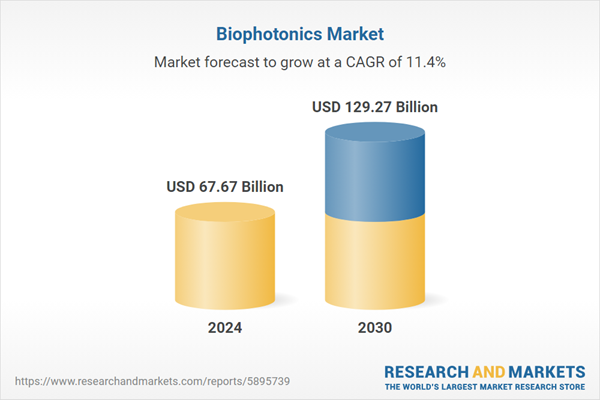Speak directly to the analyst to clarify any post sales queries you may have.
10% Free customizationThis report comes with 10% free customization, enabling you to add data that meets your specific business needs.
While medical diagnostics remains the primary application area, non-medical industries such as food safety, environmental monitoring, and agriculture are rapidly adopting these technologies for tasks like contamination detection and crop health evaluation. As healthcare systems worldwide seek more accurate, early-stage, and non-invasive diagnostic solutions, biophotonics is emerging as a transformative tool. Ongoing innovation in optical imaging, spectroscopy, biosensing, and AI-integrated systems is expected to further expand its role across healthcare and scientific domains, making biophotonics an essential part of future biomedical and environmental solutions.
Key Market Drivers
Growing Prevalence of Chronic Diseases and Aging Population
The increasing burden of chronic diseases and a rapidly aging global population are major drivers of the biophotonics market. Chronic conditions such as cancer, cardiovascular diseases, diabetes, and neurodegenerative disorders are becoming more prevalent due to aging demographics, urbanization, and lifestyle factors. In 2021, non-communicable diseases (NCDs) were responsible for about 43 million deaths - 75% of non-pandemic-related mortality - with 18 million premature deaths occurring before the age of 70, primarily in low- and middle-income countries. This rising health burden demands precise, non-invasive, and cost-effective diagnostic technologies. Biophotonics offers advanced tools such as optical coherence tomography (OCT), fluorescence imaging, Raman spectroscopy, and biosensors that enable early detection and continuous monitoring of chronic diseases. These technologies enhance clinical decision-making, reduce healthcare costs, and support better long-term patient outcomes, making them highly valuable in addressing global healthcare challenges.Key Market Challenges
High Cost of Biophotonics Equipment and Implementation
A significant challenge in the biophotonics market is the high cost associated with advanced equipment and implementation. Devices like Raman spectrometers, OCT systems, and fluorescence microscopes require substantial capital investment, often making them inaccessible to smaller hospitals, research institutions, and facilities in emerging economies.Beyond hardware, the total cost includes expenses related to integration with existing systems, skilled personnel for operation, ongoing maintenance, and training, all of which further increase the financial burden. These high costs restrict the widespread adoption of biophotonics technologies, especially in cost-sensitive regions, ultimately limiting the market’s growth potential. For broader uptake, especially in underserved areas, manufacturers must work toward developing cost-effective solutions and improving accessibility without compromising on performance.
Key Market Trends
Integration of Artificial Intelligence and Machine Learning with Biophotonics
A pivotal trend transforming the biophotonics landscape is the integration of Artificial Intelligence (AI) and Machine Learning (ML) with photonic technologies. AI-driven algorithms are increasingly used to analyze complex data from imaging and spectroscopy tools, enhancing the speed, precision, and accuracy of disease diagnosis. In applications like cancer detection and neurological assessment, AI models help recognize patterns, improve image resolution, and provide real-time feedback, thus enabling earlier and more accurate interventions. The combination of AI with biophotonics is particularly impactful in optical imaging systems, where it improves sensitivity and specificity. Additionally, AI enhances the personalization of diagnostics and treatment plans, optimizing healthcare delivery. As data-driven medicine continues to evolve, the fusion of AI and biophotonics is expected to reduce diagnostic errors, streamline workflows, and elevate the overall efficiency of healthcare systems globally.Key Market Players
- Thermo Fisher Scientific Inc
- Nu Skin Enterprises Inc
- Becton Dickinson & Co
- Glenbrook Technologies Inc
- HAMAMATSU PHOTONICS K.K.
- Olympus Corp
- Carl Zeiss AG
- Oxford Instruments PLC
- ZENALUX BIOMEDICAL, INC.
- PerkinElmer Health Sciences Inc
Report Scope:
In this report, the Global Biophotonics Market has been segmented into the following categories, in addition to the industry trends which have also been detailed below.Biophotonics Market, By Technology:
- In-Vitro
- In-Vivo
Biophotonics Market, By Application:
- See-Through Imaging
- Microscopy
- Inside Imaging
- Spectro Molecular
- Analytics Sensing
- Light Therapy
- Surface Imaging
- Biosensors
Biophotonics Market, By End User:
- Tests and Components
- Medical Therapeutics
- Medical Diagnostics
- Non-medical Application
Biophotonics Market, By Region:
- North America
- United States
- Canada
- Mexico
- Europe
- France
- United Kingdom
- Italy
- Germany
- Spain
- Asia-Pacific
- China
- India
- Japan
- Australia
- South Korea
- South America
- Brazil
- Argentina
- Colombia
- Middle East & Africa
- South Africa
- Saudi Arabia
- UAE
Competitive Landscape
Company Profiles: Detailed analysis of the major companies present in the Global Biophotonics Market.Available Customizations:
With the given market data, the publisher offers customizations according to a company's specific needs. The following customization options are available for the report.Company Information
- Detailed analysis and profiling of additional market players (up to five).
This product will be delivered within 1-3 business days.
Table of Contents
Companies Mentioned
- Thermo Fisher Scientific Inc
- Nu Skin Enterprises Inc
- Becton Dickinson & Co
- Glenbrook Technologies Inc
- HAMAMATSU PHOTONICS K.K.
- Olympus Corp
- Carl Zeiss AG
- Oxford Instruments PLC
- ZENALUX BIOMEDICAL, INC.
- PerkinElmer Health Sciences Inc
Table Information
| Report Attribute | Details |
|---|---|
| No. of Pages | 170 |
| Published | April 2025 |
| Forecast Period | 2024 - 2030 |
| Estimated Market Value ( USD | $ 67.67 Billion |
| Forecasted Market Value ( USD | $ 129.27 Billion |
| Compound Annual Growth Rate | 11.3% |
| Regions Covered | Global |
| No. of Companies Mentioned | 10 |









